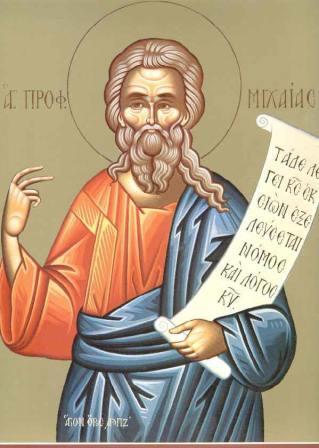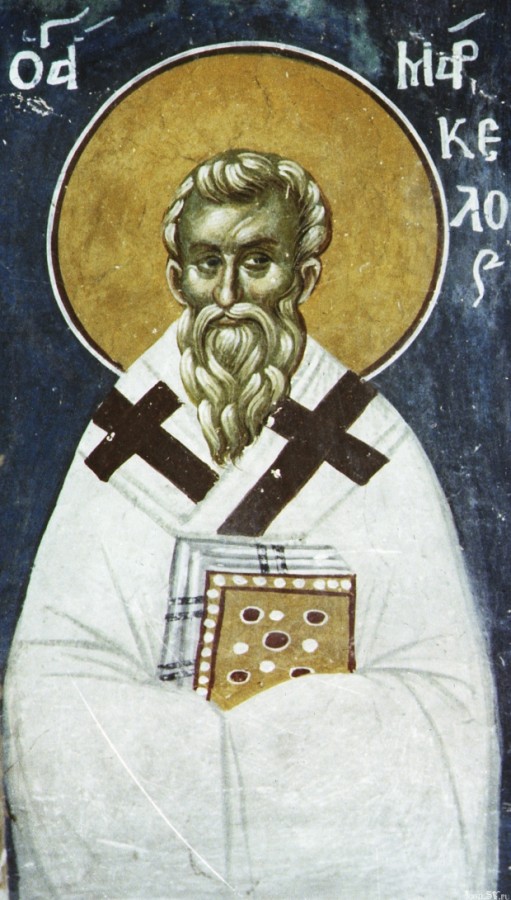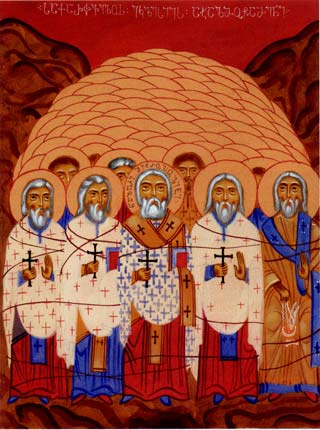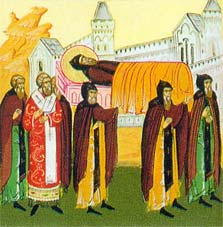|
|
The Holy Prophet Micah the Second Of the tribe of Judah and from the village of Morasth, from which he took the name "the Morasthite", he was a contemporary of the prophets Isaiah, Amos and Hosea, and the Judean kings Jotham, Ahaz and Hezekiah. He denounced the vices of his people and denounced also the prophets who prophesied "of wine and strong drink". He foretold the fall of Samaria, which would come about because the city"s elders take a bribe and the priests teach for hire, and prophets divine for money. "Therefore shall Sion for your sake be plowed as a field, and Jerusalem shall become heaps". But, of all his prophecies, the most important are those of the Messiah, and especially of the place of His birth. He named Bethlehem as the birthplace of the Messiah, "whose goings-forth have been from of old, from everlasting" (5:2). It is not known certainly whether this prophet was killed by the Jews or died peacefully (see Jeremiah 26:18-19), but it is known that he was buried in his village, and that his relics were found, together with the relics of the Prophet Habakkuk, in the time of the Emperor Theodosius the Great, by some mysterious revelation received by the Bishop of Eleutheropolis. Of the tribe of Judah and from the village of Morasth, from which he took the name "the Morasthite", he was a contemporary of the prophets Isaiah, Amos and Hosea, and the Judean kings Jotham, Ahaz and Hezekiah. He denounced the vices of his people and denounced also the prophets who prophesied "of wine and strong drink". He foretold the fall of Samaria, which would come about because the city"s elders take a bribe and the priests teach for hire, and prophets divine for money. "Therefore shall Sion for your sake be plowed as a field, and Jerusalem shall become heaps". But, of all his prophecies, the most important are those of the Messiah, and especially of the place of His birth. He named Bethlehem as the birthplace of the Messiah, "whose goings-forth have been from of old, from everlasting" (5:2). It is not known certainly whether this prophet was killed by the Jews or died peacefully (see Jeremiah 26:18-19), but it is known that he was buried in his village, and that his relics were found, together with the relics of the Prophet Habakkuk, in the time of the Emperor Theodosius the Great, by some mysterious revelation received by the Bishop of Eleutheropolis.The Hieromartyr Marcellus, Bishop of Apamea Born in Cyprus of rich and eminent parents, he was well-educated, and married and had children. When his wife died, he withdrew to follow the monastic life in Syria, leaving his child to Providence. He became known for his compassion, meekness and spiritual learning, because of which the people of Apamea chose him as their bishop. As a bishop, he laboured with zeal to bring pagans to the Christian faith. When an idolatrous temple was burned down, the idolaters seized Marcellus and, on the pretext of his having caused it, threw him into the fire, in about 389. We find in St Marcellus"s `Life" that the blessing of water is mentioned, and its use. Born in Cyprus of rich and eminent parents, he was well-educated, and married and had children. When his wife died, he withdrew to follow the monastic life in Syria, leaving his child to Providence. He became known for his compassion, meekness and spiritual learning, because of which the people of Apamea chose him as their bishop. As a bishop, he laboured with zeal to bring pagans to the Christian faith. When an idolatrous temple was burned down, the idolaters seized Marcellus and, on the pretext of his having caused it, threw him into the fire, in about 389. We find in St Marcellus"s `Life" that the blessing of water is mentioned, and its use.Martyr Ursicius at Nicomedia
Martyr Luke the Soldier
New Martyr Simeon of Trebizond (1653)For his unwillingness to convert to Islam, after imprisonment and torture, the Turks hanged him in 1653 in Constantinople.
Hieromartyr Nazarius, metropolitan of Kutaisi, Georgia, with Priest-martyrs Herman, Hierotheus, and Simon, and Archdeacon Bessarion (1924); Synaxis of the New Martyrs of Georgia who suffered under the Atheist Yoke (20th c.) Metropolitan Nazarius of Kutaisi-Gaenati was born in 1872 in the village of Didi Jikhaishi in Imereti. His forefathers belonged to a long lineage of clergy, and the future metropolitan was nurtured in the Church from the earliest years of his youth. Nazarius (known in the world as Joseph) received his education at Kutaisi Theological School. In 1892 he graduated with honors from Tbilisi Seminary and began to serve in the Church, first as a deacon and later (from February 9, 1893) as a priest... Metropolitan Nazarius of Kutaisi-Gaenati was born in 1872 in the village of Didi Jikhaishi in Imereti. His forefathers belonged to a long lineage of clergy, and the future metropolitan was nurtured in the Church from the earliest years of his youth. Nazarius (known in the world as Joseph) received his education at Kutaisi Theological School. In 1892 he graduated with honors from Tbilisi Seminary and began to serve in the Church, first as a deacon and later (from February 9, 1893) as a priest...Translation of the relics of Venerable Theodosius of the Kiev Caves (1091) The Monk Theodosii (Feodosii) of Pechersk, was the initiator of a life-in-common ustav (rule) and a father of monasticism in the Russian land. He was born at Vasilevo, not far from Kiev. From his youthful years he felt an irresistible attraction for the ascetic life, and led an ascetic lifestyle while still in his parental home. He disdained childish games and attractions, and constantly went to church... The Monk Theodosii (Feodosii) of Pechersk, was the initiator of a life-in-common ustav (rule) and a father of monasticism in the Russian land. He was born at Vasilevo, not far from Kiev. From his youthful years he felt an irresistible attraction for the ascetic life, and led an ascetic lifestyle while still in his parental home. He disdained childish games and attractions, and constantly went to church... |